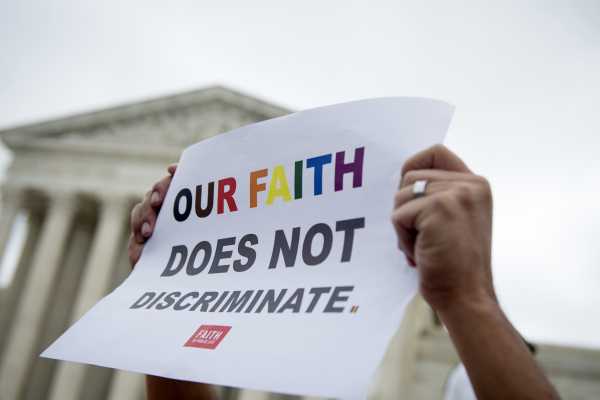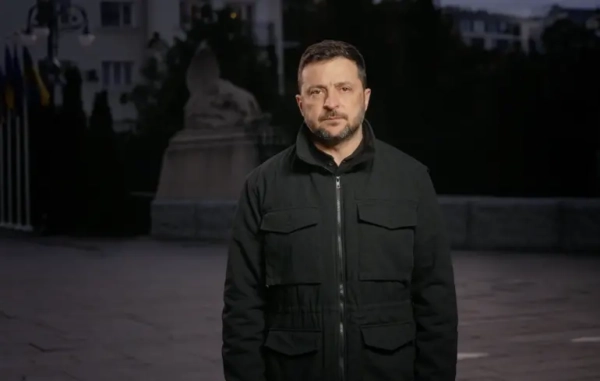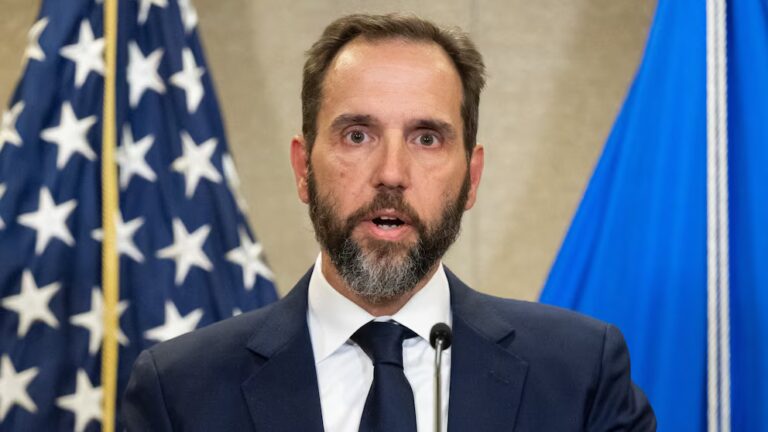
303 Creative v. Elenis, a case about a website designer who refuses to design wedding websites for same-sex couples, could potentially become one of the most consequential anti-discrimination cases in the Supreme Court’s recent history. It asks whether the First Amendment’s free speech protections give at least some anti-LGBTQ conservatives a constitutional right to violate civil rights laws.
The case is also a complete mess. Indeed, it’s hard to pin down what, exactly, the two parties to this case actually disagree on.
Lawyers from the Alliance Defending Freedom (ADF), a Christian-identified, anti-LGBTQ organization, represent Lorie Smith, a web designer who wants to sell custom wedding websites to opposite-sex couples — but not to same-sex couples. They argue that Smith should be exempt from a Colorado law prohibiting discrimination on the basis of sexual orientation.
ADF’s lawyers make an uncharacteristically strong argument. “It is bedrock law that the First Amendment protects an artist’s right to choose what to say and when to remain silent,” ADF writes in its brief. It follows that no law can force a web designer, someone who is literally in the business of publishing words that can be read by the general public, to create a website that they find fundamentally objectionable.
This is a very strong First Amendment argument. Indeed, it is such a strong argument that the defendants in this case — the seven members of Colorado’s Civil Rights Commission and that state’s Democratic attorney general — agree with ADF. Colorado law, they write in their brief, permits web designers “to decide what design services to offer and whether to communicate its vision of marriage through biblical quotes on its wedding websites.” It allows them to refuse to design websites that celebrate same-sex marriage, or to refuse to make a website that conveys any other message that they find objectionable.
The main thing that Colorado’s law requires, according to the state, is that once a web designer agrees to sell a particular web design to the public, it must provide the same service to people of all sexual orientations. If Lorie Smith would sell a website denouncing same-sex marriage to a straight customer, then she must sell that same website to a gay customer, if such a customer should request one.
Yet, while it is hard to pin down what, exactly, is the real controversy between Smith and the state of Colorado, the stakes in 303 Creative are still quite high.
303 Creative is a sequel to another high-profile Supreme Court case brought by ADF lawyers, Masterpiece Cakeshop v. Colorado Civil Rights Commission (2018), which claimed that the First Amendment permitted a Colorado baker to refuse to bake a wedding cake for a same-sex couple because the baker’s cakes were a form of “artistic expression.”
But if certain businesses are exempt from civil rights laws because they make products that require a spark of creativity, then it is far from clear which businesses should still be required to follow the law — after all, lots of jobs require at least some artistry. As Justice Elena Kagan noted during oral arguments in Masterpiece Cakeshop, if cake bakers qualify as “artists” who can defy civil rights laws, then what about jewelers? Or hairstylists? Or makeup artists?
What about a conservative Christian restaurateur who claims that their food is an expression of their most sincere religious values, and therefore must not be served to gay customers? And does it matter if this restaurateur is a classically trained chef who completed years of artistic instruction, or someone who sells simple hamburgers?
The Masterpiece Cakeshop decision didn’t really engage with these questions — although ADF prevailed in that case, it did so on narrow grounds that have few implications for future cases.
Now, 303 Creative is a poor vehicle for the Supreme Court to resolve these disputes. The case was brought prematurely, and for that reason, the most important issues in the case should be dismissed.
But the Court’s GOP-appointed majority is very eager to decide cases brought by religious conservatives, so there is no guarantee that they will dismiss the case. It is entirely possible that they will, instead, use the 303 Creative case to rule that at least some self-identified “artists” are immune from civil rights laws.
This case should be dismissed
The First Amendment’s free speech clause forbids nearly all forms of government censorship. It also prohibits the government from forcing someone to convey a message — whether through spoken or published words — that they do not wish to convey.
This is why, for example, recently enacted Texas and Florida laws that effectively order social media websites to publish content against their will are unconstitutional. Web publishers, like any other publisher, have a nearly absolute right to refuse to publish anything they do not wish to appear on their website.
The same rule applies to Lorie Smith. If Colorado actually attempted to force her to design a website that she finds objectionable, then that would violate the First Amendment. Colorado cannot make Smith produce a website that expresses approval of same-sex marriage, regardless of whether she is an amateur web designer or a professional who offers her services to paying customers. As the Supreme Court said in Rumsfeld v. Forum for Academic and Institutional Rights (2006), “freedom of speech prohibits the government from telling people what they must say.”
At the same time, the Court has repeatedly emphasized that anti-discrimination laws do not, “as a general matter, violate the First or Fourteenth Amendments.” Indeed, the Masterpiece Cakeshop decision insisted that protections against discrimination should remain strong. Though the Court said in Masterpiece Cakeshop that “philosophical objections” to same-sex marriage may sometimes carry some legal weight, it also declared that “it is a general rule that such objections do not allow business owners and other actors in the economy and in society to deny protected persons equal access to goods and services under a neutral and generally applicable public accommodations law.”
Colorado’s law threads this needle, because it guarantees “equal access to goods and services” without requiring Smith to actually produce a website she finds objectionable.
The main thrust of Colorado’s brief is that the state has no actual desire to make Smith say anything. Nor does the text of Colorado’s anti-discrimination law require her to design a website she does not wish to make. Instead, that law provides that a business cannot deny someone “the full and equal enjoyment of the goods, services, facilities, privileges, advantages, or accommodations” that the business sells to the public, because of a customer’s sexual orientation.
As Colorado explains in its brief, this law “does not turn on what a business chooses to sell. It simply requires that, once a business offers a product or service to the public, the business sells it to all without regard to a customer’s protected characteristic.” That is, Smith has an absolute right to say that she is not in the business of making websites that celebrate same-sex marriage. What she cannot do is sell a particular website to straight customers and then refuse to sell it to queer customers.
Think of it this way: Suppose an author writes a book called Lesbians Are Immoral. The First Amendment protects nearly all forms of speech, including hate speech, so this book is protected by the Constitution and the government may not pass a law seeking to alter its content or banning its sale.
Now suppose that Brenda, who is a lesbian, goes to a Colorado bookstore and attempts to purchase a copy of Lesbians Are Immoral. If the bookstore refuses to sell the book to Brenda because of her sexual orientation, that would violate Colorado’s civil rights law, and the bookstore would not be protected by the First Amendment. The First Amendment forbids the government from changing the content of a book, but once that book exists, the government may prohibit anyone who would sell it from discriminating.
The same rule applies to any other form of expression — whether it is a website, a painting, or a cake with a pro-LGBTQ message written on it in icing. The government cannot force Smith to design any website she finds objectionable. But it can require her to sell the same web design to all customers, regardless of their sexual orientation.
Which brings us to the reason the 303 Creative case should be dismissed: Lorie Smith has never actually refused to design a wedding website for a customer who wishes to buy one from her. As Colorado says in its brief, Smith’s company “has yet to build any custom wedding website, serve a customer, refuse work for a same-sex wedding, or have the [state’s civil rights law] enforced against it in any way.”
Federal courts are not in the business of deciding hypothetical cases. As a unanimous Supreme Court held in Texas v. United States (1998), “a claim is not ripe for adjudication if it rests upon ‘contingent future events that may not occur as anticipated, or indeed may not occur at all.’“ If, at some point in the future, a customer asks Smith to design a particular website, she refuses, and then Colorado attempts to sanction her for that refusal, then she may very well have a valid First Amendment claim.
But it is impossible for the Supreme Court to determine whether this hypothetical chain of events might play out in the future.
ADF wants to relitigate Masterpiece Cakeshop — and a bunch of other cases, too
The reason the Court historically has stayed away from hypothetical cases is fairly simple. As the Court said in Texas, “the operation of the statute is better grasped when viewed in light of a particular application.”
Colorado’s civil rights law, for example, turns on a very fine distinction between refusing to sell a particular product (which is permitted) and refusing to sell a product to a particular customer (which often is not allowed). It is difficult to know whether a particular litigant intends to violate this law until they’ve actually refused to make a particular sale.
ADF’s brief, however, doesn’t just ask the Court to adjudicate a hypothetical future dispute between Smith and the state of Colorado; it spends a surprising amount of time discussing superficially similar cases involving wedding vendors who refuse to serve same-sex couples:
Even assuming that ADF is not mischaracterizing the facts of any of these lawsuits, none of these cases are before the Court in 303 Creative. All of them involve different facts than Lorie Smith’s case, and many of them took place in different states, where the relevant anti-discrimination law may not draw the same distinction — between refusing to sell a product and refusing to serve a particular customer — that Colorado’s law draws. It’s hard to think of a valid legal reason ADF would include this paragraph in their brief, except that they hope it might goad the conservative majority on the Court into handing down a sweeping decision to end what ADF describes as a widespread problem.
We should hope that the Supreme Court will resist the temptation to do so. The question of how the First Amendment should apply to creative workers and business owners is not easy, and it typically turns on the nuanced facts of each particular case.
Because Smith is in the business of writing words and publishing them online, for example, she actually has a very strong case that her business is protected by the First Amendment — and that Colorado may not, if such a case should arise in the future, compel her to produce a particular website against her will.
But the same cannot be said about a florist or a cake baker. Sure, a florist may have a First Amendment right not to arrange a bunch of roses to spell out the words “GAY MARRIAGE IS AWESOME!” But the First Amendment does not permit a florist to refuse to sell a particular flower arrangement to a straight couple and not sell that identical arrangement to a gay couple. And it would be a constitutional earthquake if the Supreme Court held that the First Amendment does protect such a florist, because it would mean that anyone whose work requires some degree of artisanship could potentially seek an exemption from civil rights laws.
Again, there may well be valid cases where the First Amendment overcomes a civil rights law. But these cases are nuanced and fact-specific, and they often turn on the very particular wording of state civil rights statutes. We can only hope that this Supreme Court resists the temptation to hand down a sweeping decision in 303 Creative, and instead tells Smith — and people similar to Smith — to wait until she has a real case.
Sourse: vox.com






